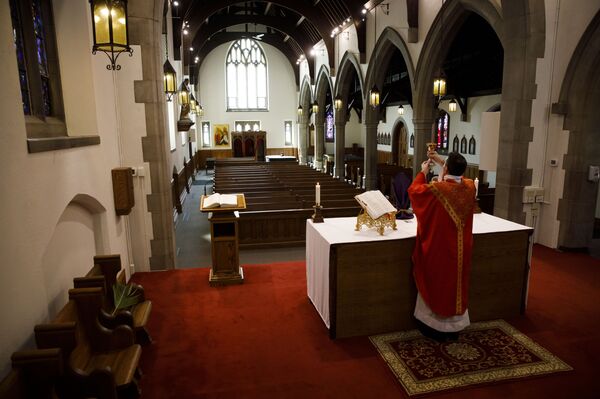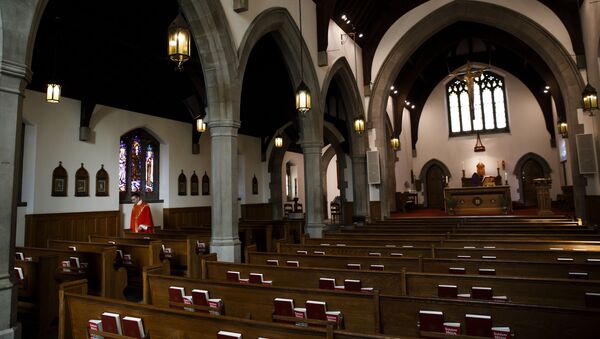Representatives of 300 Christian churches in Ontario signed an open letter to the provincial government, asking Premier Doug Ford, the local Ministry of Health and Ministry of the Attorney General to allow them to re-open for services in June.
According to the founding Pastor of Toronto’s Westminster Chapel at High Park Reverend Joe Boot, who co-authored the letter, Christian churches are vital for society and should be allowed to function again with strict social distancing rules and sanitary protocols in place.
Sputnik: There has been no specific ban on church services in your province, but Ontario authorities did not list church services as essential activities either. Online services are still being held but are the worshipers allowed to congregate in person at the moment?
Reverend Joe Boot: At the present time churches are not meeting, congregational meetings are not happening. So people are not going to church and there is no administration of sacraments in the life of churches or preaching of gospels. Public gatherings of that nature are not happening across the province, and, in fact, across most provinces. I think Alberta started lifting some restrictions, but here in Ontario, there is no indication of those lifting just yet.
According to the provincial government's data, the number of registered COVID-19 cases in Ontario is currently at 21,494, with 258 new cases being recorded on 13 May.
Sputnik: Authorities in other Canadian provinces, such as New Brunswick, specifically mention the time when churches will be re-opened – they say that it will be in the “third phase” of steps. There seems to be no such certainty insight for churchgoers in Ontario, as the province’s own plan doesn’t mention places of worship. In your letter to Premier Doug Ford you wrote that “the church is not comparable to a sports or dance club and cannot be dismissed as non-essential by an expert in any field.” Do you think that the authorities will listen to you?
Reverend Joe Boot: I’m optimistic that they will. Doug Ford has historically been reasonably friendly towards Christians and Christian churches. But until now there hasn’t been any pressure applied to the provincial government. There was one incident of a church that tried to do a drive-in service in Ontario. The police was sent and they were filming the incident and so on. Ontario has been pretty tight compared to some of the other provinces. But we’re optimistic that given the sheer number of people and churches that are represented in this letter, that it will have an impact.
Polls show that more than half of Canadians identify as Christians. In some provinces church-goers are allowed to gather outside, but in Ontario there is no such practice. An attempted “drive-in” service in Aymler, ON, where worshipers remained in their cars, led to police action pic.twitter.com/95PKKLhQTL
— Denis Bolotsky (@BolotskySputnik) May 14, 2020
My own personal view is that Doug Ford and the provincial government are being led by the technocrats at the moment, by medical experts, rather than primarily by politics, so I think they’ve been very afraid or nervous of contradicting anything that medical professionals are telling them or advising them what to do. So, we’re trying to apply respectful pressure to say that we’re not comparable to a sports club or a gym, we have mercy ministries in our communities.
And church, as I say in the letter is an institute that long predates even the founding of Canada and we are accustomed to historic freedoms and Charter freedoms being respected.
We are prepared to go back in a safe way in a sense that we’re not trying to ignore social distancing guidelines and so forth, but if you can be in a large hardware store with people shopping – why can’t you be in church with social distancing as well?
Sputnik: We saw church closures all over the world, including the Vatican, with Pope Francis cancelling his public appearances and most church events being re-scheduled or suspended. The number of COVID-19 cases in Canada’s populated areas such as Ontario and Quebec is still high. By 13 May a total of 72,278 cases have been registered nationwide, which puts Canada in the world’s top 20 for coronavirus statistics. Don’t you think it’s a bit early to talk about re-opening of churches in your province?
Reverend Joe Boot: Not really. I think, given some of the public spaces are opening up – they are talking about parks opening up, and I mentioned a number of superstores, and so forth, that are opening up, and large hardware stores, it would be strange indeed if churches are not able to open up at the same time that some of these retail outlets are opening up. But I would also add that from our perspective, unlike playing soccer or being part of a dance club or something that may not be opening up yet – those are not fundamental freedoms guaranteed in the Charter [of Rights and Freedoms].
You can be a member of a sports club and play soccer, but religious freedom, the freedom of assembly – these are Charter freedoms in Canada.
And preambles of the Canadian Charter assert the supremacy of God and so we are appealing respectfully to the provincial government that we can safely and respectfully open our churches for worship to about 40% capacity, respect social distancing, have hand sanitizers, wipe down surfaces between services, and do it safely. When you look at Canada, or at the province of Ontario – the vast majority of our cases are in long-term care facilities. We think resources should be directed towards protecting the most vulnerable.

Sputnik: The pandemic changed many things, which were previously parts of life for clergy members – not only the weekly church gatherings but also – spiritual guidance for those who are ill. In many countries priests are not allowed to offer assistance to patients anymore because of COVID-19. Do you see the same approach in Ontario?
Reverend Joe Boot: Part of the church’s service historically has been to minister to people who are sick and dying and the fact that we can’t be at the bedside of people in hospitals or in care homes, who are sick and dying or dying alone – this is a real concern for us as a church. So, it’s not only about public gathering for preaching and the sacraments, and worship, it’s also about our historic role in ministering in society. And overall our concern, I would say, if the response is reductionistic. In other words, we’re paying great attention to the effect of a virus biologically, but we’re paying very little attention to the impact of socialized elation, poverty, addiction, mental health issues, the cancellation of operations – these are all the things that are going on in Ontario that are affecting our churches and our people. We are very concerned about that, and we’re concerned that the long-term health implications of those things will end up being far worse than the virus itself if we’re not being careful.


